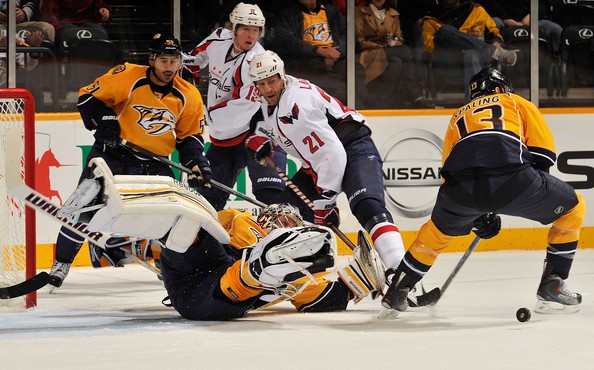When it was announced yesterday that Senators defenceman Jared Cowen had been assigned back to Spokane of the WHL, I admittedly was pretty disappointed.
Had he played well enough to distinguish himself amongst Ottawa’s top six defencemen since Filip Kuba went down with an injury? I certainly thought so. I had hoped that the organization would extend him the same opportunity that Erik Karlsson received last year. However, the more I thought about it, the more I realized that by giving him a 9-game trial, they would have only been delaying the inevitable.
“(He was) very (disappointed). He probably was thinking he’d get a start here at any rate and we’d make a decision a little ways into the year.
Rather than kind of fool around with him and leave doubts in his mind, I wanted to make it cut and dried that he’d go back and just play.” ~ Bryan Murray via The Montreal Gazette
Barring further injuries, Kuba’s return to the blueline would have created a log jam on the blueline. I find it odd that in an interview with James Duthie during the second period intermission of the Kraft Hockeyville game, Bryan Murray singled out Cowen and Gonchar out as two of the new faces who have impressed with their play.
Was it just lip service? Or am I supposed to believe that in the games that followed Murray’s comment that Cowen played himself off of the roster?
I don’t think it was either. Thanks to Brian Lee’s one-way contract and uncertainty that David Hale would clear waivers if he was demoted to Binghamton, Cowen’s demotion is as much a complicated numbers game as it was an assessment of his ability to contribute at this level.
“This is where I think I can improve the most. If I went back to junior, it would be a step back. If I stayed here, I’d obviously get a lot better and become a better player. Going back to junior, it would be a familiar spot — Spokane’s a nice place to play, I love the guys on the team, love the coaching staff and everything.
But this is a step forward. This is where I want to start.”
The above comments were made by Cowen in a feature story that ran on TSN’s website a few weeks ago. In the same article, Jon Klemm, an assistant coach for the Spokane Chiefs, indicated that he believed that Cowen already possessed the skills needed to play in the NHL.
“He’s a big, physical presence out there. He can change the game at any time with a big hit or a great defensive play. That’s kind of the player he is. …
He handles himself very well not only on the ice but off the ice — he’s great in the locker-room, he works extremely hard. It was a pleasure to work with him last year.”
Now that Cowen has to return to Spokane, Sens fans have to hope that it’s best for his development to return to play junior for a fourth season. At this stage of his young career, will it be beneficial for Cowen to play against smaller, less talented competition? Will Cowen’s demotion put him in eff you mode and motivate him to stick to Ottawa’s management and dominate the WHL or will his development stagnate because he’s playing at the same level of competition for four straight years? It’s not like his participation in the AHL would prevent him from participating in the World Junior Hockey Championships either.
So what exactly is in the best interests for Jared Cowen’s development?
It’s an intriguing question to ask and one that can be hotly contested. Personally, I think it’s a tad ridiculous that Robin Lehner eligible to play in the AHL and Jared Cowen is not. Both are 19 years of age and were drafted in 2009 NHL Entry Draft. The difference? Unlike Cowen, players like Lehner, John Carlsson and Jeremy Morin are eligible to play in the AHL because at the time that they were drafted by a NHL team, they had not dressed for a game with a CHL team yet. According to an agreement that the Canadian Hockey League has with the NHL, players drafted out of the CHL can only play in the AHL if they turn 20 years old by Dec. 31 or have played in the CHL for four seasons.
In the words of David Branch, “There are certain provisions in the NHL-CHL agreement which contemplate what happens in terms of where a player may be assigned to etc. based on where he’s drafted from.”
I don’t want to turn this into a debate as to whether there should be some universal standard as to whether teenage prospects should be returned to the CHL teams that own their rights. I think every individual player’s situation and circumstances surrounding them is unique. One could argue that an exodus of elite 19-year old talent could hurt the CHL product, however, when the NHL invests more than $8-million in development money each season, should NHL organizations have the ability or opportunity to decide what is in the best interests of their prospects’ development? (Ed. note: Exodus of elite talent? That’s rich. It’s not like the CHL has a problem taking some of Europe’s elite junior aged players.)
“You look at his size and his maturity level, definitely I think he’s got a shot at the NHL (this season),” said Klemm. “You know the Senators are going to give him every opportunity to make the team.”
Every opportunity? That’s questionable. Especially when you consider that he doesn’t get the same ones that are afforded to others like Lehner.
Add The Sports Daily to your Google News Feed!
